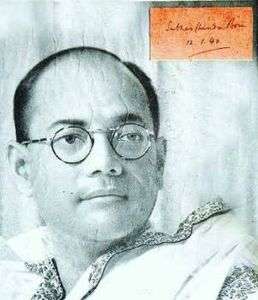Abid Hasan
Abid Hasan Safrani, IFS ,born Zain-al-Abdin Hasan, was an officer of the Indian National Army and later, after 1947, an Indian diplomat.
Born to an anti-colonialist family in Hyderabad, Abid Hasan was brought-up in India and later went to Germany to train as an engineer. It was while he was a student in Germany during World War II that Abid Hasan met Subhas Chandra Bose and decided to join the Indische Legion. Hasan would later serve as Bose's personal secretary and interpreter while Bose was in Germany. Hasan also sailed with Bose in the German U-Boat U-180 in 1943 on Bose's voyage to South East Asia. Over the course of the reformation of the INA and its campaigns in the south east Asian theatre, Hasan rose to be a Major in the Azad Hind Fauj. It was also during this that he adopted "Safrani", after the holy Hindu colour of Saffron, to his name as a mark of communal harmony.
After repatriation to India at the end of the war, Abid Hasan was released following the end of the INA trials in 1946 and joined the Indian National Congress briefly. After partition, Hasan chose to settle in Hyderabad and joined the nascent Indian Foreign Service. Over a long diplomatic career, Hasan served as the Indian Ambassador to a number of countries including Egypt and Denmark before retiring in 1969 and settling back in Hyderabad. Abid Hasan Saffrani died in 1984. According to Leonard Gordon, author of Brothers Against the Raj, Abid Hasan Safrani coined the salutation "Jai Hind" (Hail India).[1] It was the shortened form of "Jai Hindustan Ki". The term was made famous by Netaji Subash Chandra Bose's INA and its subsequent use as a national patriotic salutation in independent India. Netaji Bose's nephew Aurobindo Bose later married Safrani's niece.
Scholarly activities
Hasan was also a scholar who spent long hours with his Persian and Urdu poetry.[2] His Hindi-Urdu translation of Jana Gana Mana with the music from Ram Singh Thakuri, became Subh Sukh Chain, the anthem of the Provisional Government of Free India.[3]
References
- ↑ "A tale of two cities". The Hindu. 30 January 2014. Retrieved 31 January 2014.
- ↑ Doctor, Geeta (23 March 2002). "On a slow boat with Safrani". The Hindu. Retrieved 2016-03-15.
- ↑ "A tribute to the legendary composer of National Anthem", The Tribune, 2002-05-04, retrieved 2008-11-10,
Snippet: ... Capt Ram Singh would be remembered for his composition of Jana Gana Mana, the original script of which was a little different. It was Sukh Chain Kee Barkha Barse, Bharat Bagiya Hai Jaga. The song was based on a poem by Rabindranath Tagore and was translated into Hindi by Abid Ali. ...
- Jai Hind Safrani. From The Hindu
